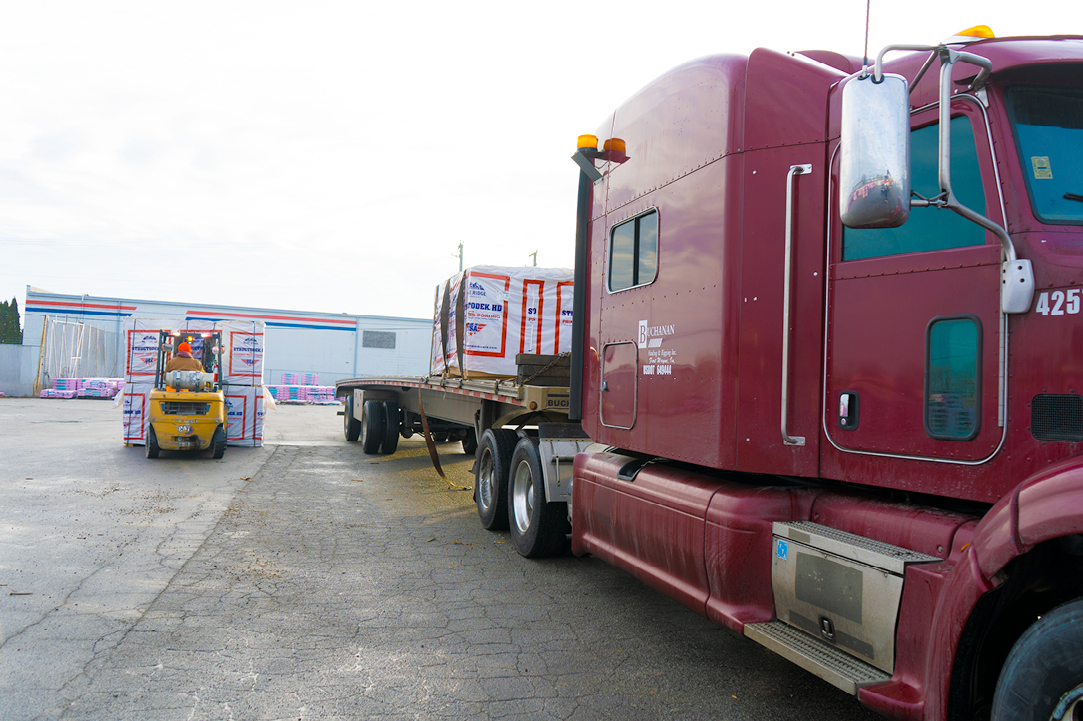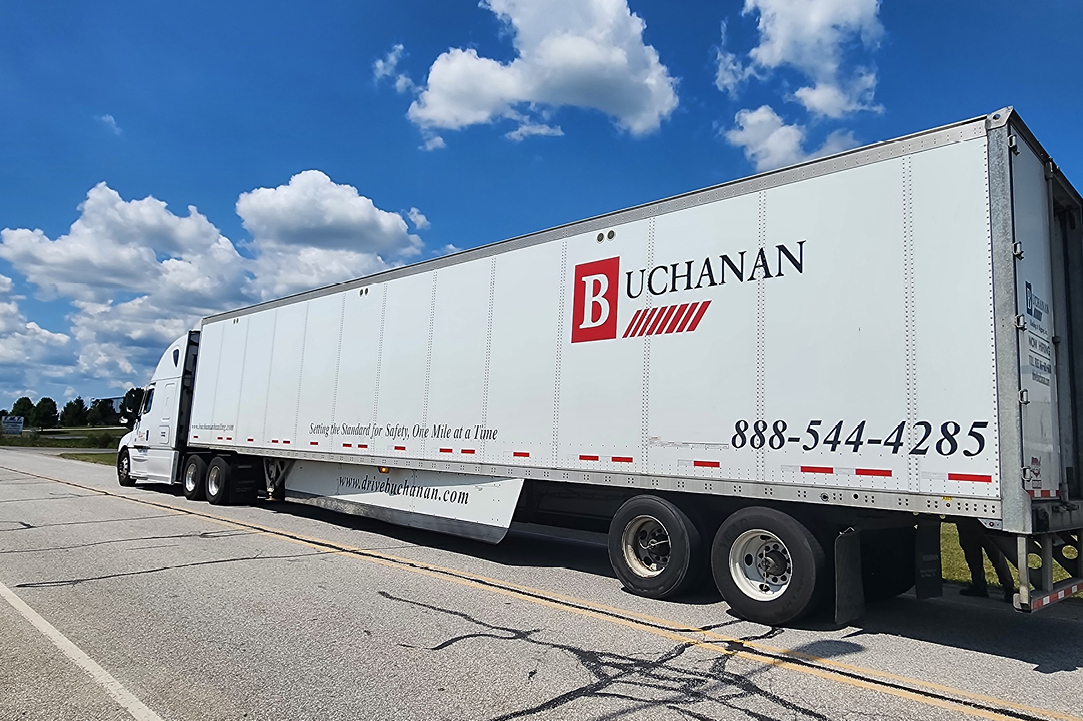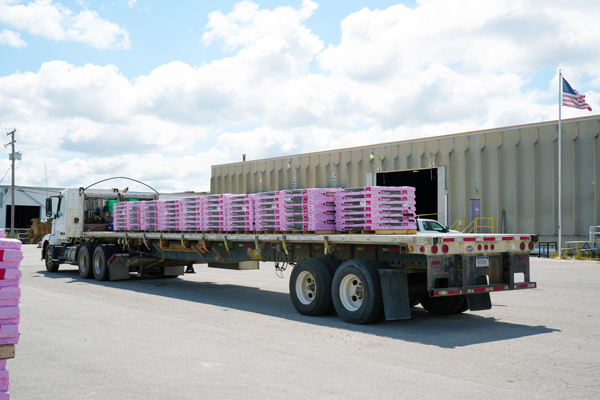
Retail and consumer product companies face more than cost and transit time when picking a freight transport partner. Every truck, every trailer, and every delivery influences shelf fill, brand promise, and customer experience. Missed windows, damaged fixtures, unpredictable claims, or lack of visibility all affect profit and reputation. This guide provides 10 factors that matter most for companies shipping freight to a single retail store or even chains like Walmart, Target, Meijer, Lowes, Home Depot, Menards, or others.
1. Shipment Types & Trailer Fit
Your transport partner must be able to offer the right mix of trailers for every kind of freight you ship. Dry van trailers protect boxed consumer goods, electronics, and non-perishables. But display fixtures, store shelving, and HVAC units require flatbeds, drop decks, step decks, or removable gooseneck (RGN) trailers. Buchanan Logistics offers flatbeds, dry vans, drop decks, curtainsides or Conestoga, and specialized heavy-haul equipment. That lets you move shingles, seasonal fixtures, large signage, and oversized displays with correct rigging. When retail orders include fragile or high-value loads, the trailer type makes all the difference. See Buchanan Logistics Freight Capabilities
2. On-Time In Full
Big retailers use OTIF (On-Time In Full) as a key performance measure requiring shipments to arrive as scheduled and complete. Grocery chains cannot afford delays for perishables. Home improvement stores demand arrival before the promotion launch. Your provider must have real proof of on-time delivery rates, resilience for detours, weather, holiday strain, and dock appointment scheduling. Buchanan Logistics delivers 99% on-time performance, supported by tracking metrics and contingency routing so your product arrives when promised. See The Buchanan Advantage for details.
3. Visibility and Tracking
Knowing where your freight is at every moment matters. Tracking systems, proof of delivery, alerts for delays, and permit status for oversize freight all reduce surprises. Retail operations often require syncing with inventory systems, receiving docks, or special handling. Buchanan Logistics provides real-time shipment visibility.
4. Transparent Pricing

Rates are not just based on miles. Fuel surcharges, accessorials like liftgate or inside delivery, detention time, overweight permits, fragile packaging, and expedited fees—all can add cost. If your quotes exclude them, you face surprises that erode margins. Buchanan’s rate request process is clear, helping you plan costs for promotions and inventory. Start with a clear quote on the Rate Request page.
5. Heavy, Oversized, and Project Freight
Retailers often need more than small pallets. Display fixtures, store shelving, roofing materials, and large signage must be transported on trailers built for height and weight. Oversized freight requires certified carriers, permits, escorts, and specialty trailers. Buchanan’s network includes specialized heavy-haul equipment for oversize and display freight. Whether large fixture moves or multi-truck crane shipments, Buchanan aligns the right trailer and carrier for your project.
6. Safety and Claims Handling
A damaged display fixture arriving in poor condition reduces brand value. Faulty handling erodes retailer trust. You want a partner with a strong safety culture, a low claims ratio, strict carrier vetting, and clear claims handling. Buchanan Logistics holds itself to rigorous safety standards. Their claim ratio is under 0.5%. Carriers are vetted carefully, protecting your brand and reducing risk. With a claims ratio under 0.5%, Buchanan vets every carrier to protect your brand. Learn more on the Mission and Family Values page.
7. Cross-Border Reach
Your supply chain may cross state lines or borders with Canada or Mexico. A partner who forces you to transload at the border adds cost, risk, and delay. Buchanan Logistics serves all 48 states plus Canada and Mexico without transloading. This eliminates hand-offs that damage freight or slow perishable shipments.
8. LTL vs FTL
Retailers ship both small and large loads. Some stores need small restock pallets while others need full trailer loads. Knowing whether your provider handles both LTL and FTL matters. Buchanan Logistics offers both, supporting frequent small shipments and major freight moves.

9. Retail Compliance
Large retailers enforce strict dock windows, safety and packaging standards, and appointment rules. Missed windows mean delays, fines, or refusal. Buchanan Logistics works with retail and grocery stores and understands those requirements. They plan routing and scheduling to ensure your goods arrive when the dock is ready.
10. Why Buchanan Logistics Outperforms Competitors
- Rigorous carrier vetting and low claims ratio
- Real mix of specialized trailers for retail freight
- Transparent pricing with fewer surprises
- Cross-border trucking without transloading
- Real-time visibility with dedicated customer service
- Knowledge of retail dock scheduling and compliance
How to Evaluate Your Partner: Questions to Ask
- What is your on-time and OTIF performance?
- Which trailer types do you provide?
- Do you handle display fixtures and oversized freight?
- How transparent is your pricing?
- What visibility tools are in place?
- What is your claims history?
- Do you have experience with retail compliance and dock scheduling?
- Can you handle cross-border shipments?
- Do you offer both LTL and FTL service?
Resources
Check out our company overview ebrochure:



